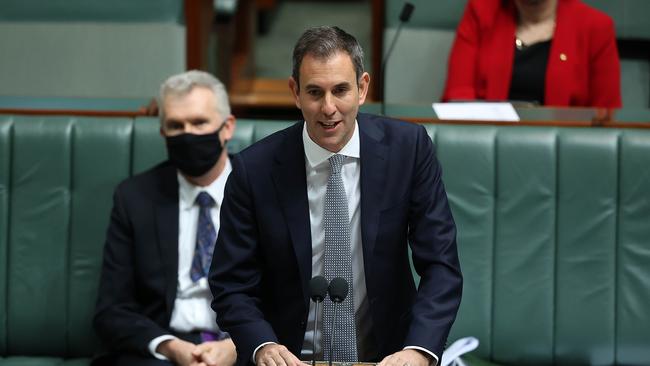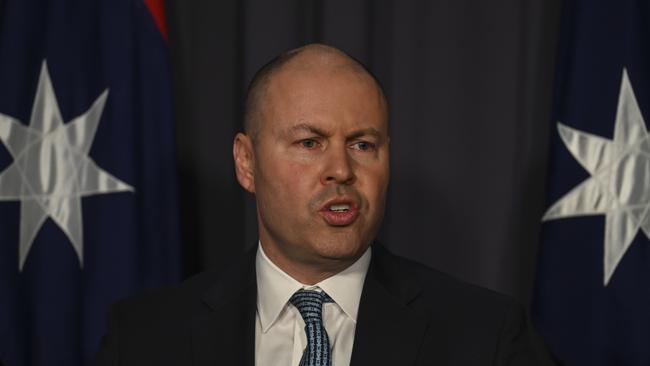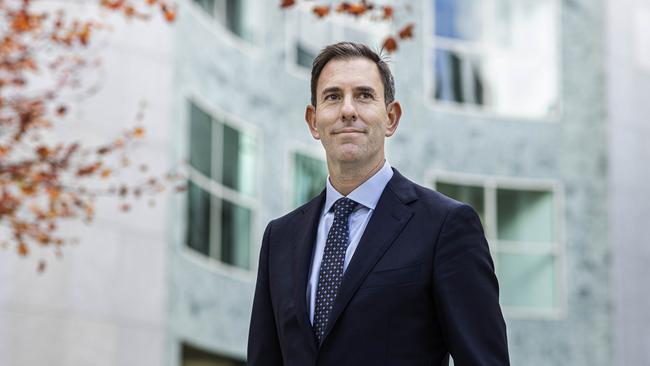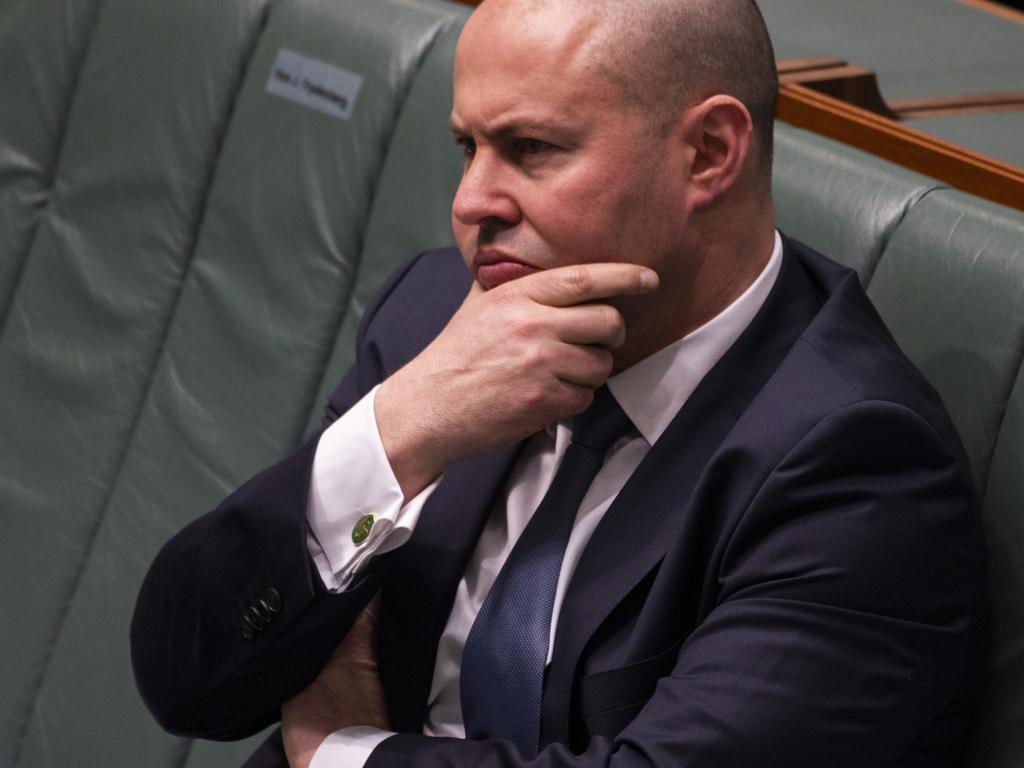Who will save Australia from our growing call on taxpayers?
While attention was on nuclear subs and tremors on the streets of Melbourne, a pair of top Canberra bureaucrats quietly laid the foundation for the next federal election.

On Monday, Treasury’s Steven Kennedy and Finance’s Rosemary Huxtable issued the latest policy costing guidelines during the caretaker period prior to a federal election. It’s a standard move under the Charter of Budget Honesty, a check since 1998 on the wild rhetoric and extravagance in our politics.
No matter who wins the coming poll, the Covid-19 shock to the budget will eventually be unwound and we’ll get a better sense of which elements were transitory and which have been baked in as “forever partnerships” between a bulging Canberra and the good old Australian taxpayer.
At some point in the next term of government, sooner rather than later, the treasurer of the day will have to lay out a comprehensive program of budget repair, not simply a cursory exercise in good housekeeping. It demands a set of hard rules and reforms that will enable us to live within our means.
We’ve been existing hand to mouth, lockdown to lockdown, with our politicians transfixed by the momentous and the daily micro aggressions of partisanship. No other rich country had such a dramatic turnaround in budgeting last year, as Scott Morrison and Josh Frydenberg threw everything at a supply-starved economy.

Yes, Delta has changed the health equation and led to interminable lockdowns around the southeast of the country, which pumps out almost 60 per cent of all the goods and services we produce. But, with half the population aged over 16 fully vaccinated, and reopening gateways coming into view, this semblance of “not-crisis” calls for a new approach to taxing and spending.
It won’t happen before the election, but the nation would benefit from a Statement of Budget Reality, an explanation from Frydenberg and Labor’s treasurer-in-waiting, Jim Chalmers, to explain what happens to spending and taxing when the recovery is locked in, unemployment falls below pre-crisis levels, and companies restore and expand their capital spending. Officials can’t share in public what they tell their bosses in private but their advice seeps out in peer reviews by the OECD and International Monetary Fund.
“Whatever it takes” has had its day, disaster payments and perennial election baksheesh notwithstanding, and budget realists believe some fiscal fixing is required to build up our buffers for the next crisis and to not overburden young people with high debt and taxes. “Let’s not forget, young people are the ones who have made the biggest sacrifices during the pandemic, basically to protect our seniors from getting and dying from Covid-19,” an eminent Canberra source tells Inquirer.
A report this week from the Parliamentary Budget Office provides a snapshot about what the budget challenges are likely to be. The good news, according to the independent PBO’s Beyond the Budget paper, is that we don’t need austerity to get our deficits and debt under control, even if interest rates rise from their dirt-floor lows. By the end of the current four-year budget cycle, federal government net debt is projected to peak at just under $1 trillion or 40.9 per cent of GDP, before drifting down over the next four decades.
We don’t even need to get the budget back into surplus; the key is to keep growing the economy ahead of the interest bill. The PBO can only work with what policymakers have foreshadowed, but it does say “the quality and efficiency of public spending, whether for services or investments, are crucial”. Frankly, there’s a lot of muck, little of which gets attention. “The commonwealth’s fiscal position can remain sustainable over the longer term even if the government continues to run modest deficits,” the PBO concluded, outlining a fairly benign trajectory for deficits and debt. “These results do not require governments to achieve budget surpluses, nor do they require interest rates to remain at their current low levels.”
But future governments aren’t completely off the hook. The PBO says they’ll need to act consistently and early on budget repair, and they identify several key risks, not least of which are the ongoing pandemic and the government’s response and the broader economic outlook. Their scenarios are based on past performance, so it would be more difficult for Australia to maintain a fiscally sustainable position if future shocks are consistently larger or more frequent. Welcome to the new age of imperilled security, trade smackdowns, virus contagion and net-zero emissions!
As well, the PBO pinpoints a risk our politicians don’t spend nearly enough time on in their storytelling: community expectations “around the quality and volume of services provided by government”. In a pandemic spending blitz during an era of ultra-cheap money, with an ageing population demanding better aged care and health treatments, there’s a creeping tendency here to think we can have it all.

The National Disability Insurance Scheme, with its spending footprint expanding to reflect more participants and rising average payments, has officials perturbed. Projections aren’t easy because it’s a relatively new program and is demand-driven. The number of NDIS participants is set to double over 10 years to between 800,000 and 900,000 people.
“The number of potentially eligible NDIS participants depends on the nature and prevalence of eligible conditions – that is, permanent and significant disability or a developmental delay – and the budget each participant receives depends on their individual circumstances, which varies widely across participants,” the PBO said, adding participants’ use of their planned budget tends to increase with time as they understand the scheme and services available.
So, by 2031-32, the annual cost to governments would be $59bn if costs are curtailed or $75bn if they’re not, and it could even go higher. The community has not caught up with the potential of the NDIS costing more than Medicare or aged care.
We need to make our monolithic programs more efficient and cost-effective or they’ll have to be rationed, such as in home-care packages for the elderly. Treasury boss Kennedy outlined some of the ways aged-care services are being reformed in a May post-budget address. Productivity Commission chairman Michael Brennan chips away at how to get more out of our health system and other government services. Are Frydenberg and Chalmers listening?
But the other side of the budget is in a more parlous state. The question on the size of government is settled in a “no new taxes” consensus, especially after the brutal 2019 poll. As part of its medium-term fiscal strategy, the government has a commitment to maintaining tax receipts at or below 23.9 per cent of GDP. In a decade’s time, the PBO projects that total tax receipts will be a full percentage point below that cap.
Gough Whitlam expanded the state in a three-year whirlwind, and it’s been elevated ever since, with enduring programs added here and there by Labor and the Coalition, such as Medicare, NDIS, school funding, family payments and superannuation tax breaks.
Bill Shorten’s pre-poll hubris and insecurities about why he’s in politics led his party to its own Fightback! overreach, but in the opposite direction – a tax-and-spend social utopia. At least we knew what Shorten Labor was for: everything.
But the tax system is not fit for purpose, as an increasing over-reliance on personal income tax shows, and a rickety two-decade-old GST is not the growth tax we were told it was destined to be. This week, former Treasury secretary Ken Henry, who reviewed the tax system more than a decade ago, said it was in a perilous state, and heading in the wrong direction “We are back to where we were in the several decades following World War II,” Henry told a policy forum hosted by the ANU and Business Council of Australia. “This was a period characterised by ill-disciplined public spending, only partly funded, with a heavy reliance upon fiscal drag that punished innovation, enterprise and effort; distorted the pattern of saving; and rewarded tax avoidance and evasion.”
In its “health check” on Australian finances, released on Friday, the IMF said tax reforms would aid investment and promote efficiency. The Washington DC-based body also urged a move away from stamp duties on property transaction to a general land tax to stabilise revenue for state governments and for people to move to where there’s work.
“A longstanding recommendation is for Australia to reduce its relatively high direct taxes and instead strengthen indirect taxes, by reducing the corporate income tax burden and relying more on goods and services tax (GST) revenue, while making the impact of the latter less regressive for households through targeted cash transfers,” the IMF said, echoing last week’s OECD survey of our country.
IMF Australian mission chief Harald Finger diplomatically outlined to reporters the consequences of sticking with the current tax system. “So, we think the tax reform would be helping economic efficiency and strengthen Australia’s position, both fiscally over the medium term, to put the finances on a sounder and broader basis,” Finger said.
He added a better system of direct taxation encourages more entrepreneurship and investment: “So not pursuing the reform basically means losing out on the gains that one can have for better incentivising investment.”
With our sagging productivity holding back a rise in living standards, we need all the magic of fresh capital we can get. As well, on equity grounds, we’ll need to address the horizontal distortions at play for people earning the same income. A wage and salary earner on $120,000 a year pays a lot more tax than a sole trader or tradie with a new ute.
Right now, the main driver of the extra tax to pay for our future spending is that “thief in the night” of bracket creep, as the Prime Minister once described the crime against aspiration, where a higher proportion of a person’s income is taxed because of wage inflation. The Coalition’s tax cuts will help some, but not all taxpayers.
The PBO found that only individuals currently earning between $96,000 and $168,000, or around one in eight taxpayers, are projected to have lower average tax rates in 10 years’ time. “For other taxpayers, bracket creep is expected to more than counter the impact of all three stages of the tax cuts over the next decade,” it said.
That’s a grim prognosis, especially for younger workers with morbidly obese student debts and family obligations, trying to get a foot on the escalator of home ownership. Their baby boomer parents will not only be up in the clouds of tax-free capital gains, but they’ll be sitting on nest eggs acquired with the help of generous tax concessions, living the life! Oh well, see you in the comments section and be careful with the pitchforks.
Now Frydenberg, 50, and Chalmers, 43, are poised to be in positions of influence over the coming decade. With a bit of imagination and courage, one could seemingly build a budget and structural reform platform around wealth creation and growth, the other on equity and opportunity. The leader Australia needs should aim high and do both. Are they game?







While attention this week turned to nuclear submarines and tremors on the streets of Melbourne, a pair of top Canberra bureaucrats quietly laid one of the necessary foundations for the next federal election.